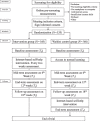Internet-based self-help intervention for procrastination: randomized control group trial protocol
- PMID: 36747265
- PMCID: PMC9900198
- DOI: 10.1186/s13063-023-07112-7
Internet-based self-help intervention for procrastination: randomized control group trial protocol
Abstract
Background: Procrastination or "postponing until later" is a common phenomenon defined as the intentional delay in partaking in and finishing important activities despite negative outcomes potentially outweighing the positive. Procrastination adversely affects mental health, academic performance, and career achievement. Although studies on procrastination intervention methods and effectiveness exist, utility and cost-effectiveness are limited by various factors, including practitioner availability and skills, barriers to participant participation, and the time investment required by participants. Thus, internet-based interventions could increase the availability of evidence-based treatments for adult procrastination.
Methods: This study explored the efficacy of an online-based self-help intervention in the context of voluntary procrastination among undergraduate psychology students. The study design is a randomized controlled trial. Participants who self-reported procrastination-related problems and behaviours were included in the trial consisting of two groups; specifically, one group undergoing a self-directed internet-based intervention for coping with procrastination (N=160) and (2) another group with delayed access to the intervention programmes (waitlist control group; N=160). Follow-up assessments were scheduled 6 and 12 weeks after baseline, and the control group received the intervention after 12 weeks. Procrastination, measured by the Irrational Procrastination Scale and the Simple Procrastination Scale, was examined as the primary outcome. Meanwhile, secondary outcomes included susceptibility, stress, depression, anxiety, well-being, self-efficacy, time management strategies, self-control, cognition, and emotion regulation. Other measures comprised acceptability (e.g., intervention satisfaction, potential side effects, and expectations) and learning behaviour analysis to reflect adherence.
Discussion: This randomized controlled trial will provide data on the effectiveness of online interventions for adult procrastination. If deemed effective, this low-cost, high-coverage internet-based intervention could aid more people who seek to address their procrastination.
Trial registration: Chinese Clinical Trial Registry. https://www.chictr.org.cn/showproj.aspx?proj=171246 .
Keywords: Cognitive behavioural therapy; Control group randomized trial; Internet-based intervention; Procrastination; Self-regulated learning theory.
© 2023. The Author(s).
Conflict of interest statement
The authors declare that they have no competing interests.
Figures
Similar articles
-
Effectiveness of an internet-based intervention for procrastination in college students (StudiCare Procrastination): Study protocol of a randomized controlled trial.Internet Interv. 2019 Mar 26;17:100245. doi: 10.1016/j.invent.2019.100245. eCollection 2019 Sep. Internet Interv. 2019. PMID: 31080750 Free PMC article.
-
Effectiveness of a guided internet-based intervention for procrastination among university students - A randomized controlled trial study protocol.Internet Interv. 2023 Mar 3;32:100612. doi: 10.1016/j.invent.2023.100612. eCollection 2023 Apr. Internet Interv. 2023. PMID: 36922962 Free PMC article.
-
Internet-based cognitive behavior therapy for procrastination: study protocol for a randomized controlled trial.JMIR Res Protoc. 2013 Nov 12;2(2):e46. doi: 10.2196/resprot.2801. JMIR Res Protoc. 2013. PMID: 24220277 Free PMC article.
-
Procrastination and Stress: A Conceptual Review of Why Context Matters.Int J Environ Res Public Health. 2023 Mar 13;20(6):5031. doi: 10.3390/ijerph20065031. Int J Environ Res Public Health. 2023. PMID: 36981941 Free PMC article. Review.
-
Procrastination, Perfectionism, and Other Work-Related Mental Problems: Prevalence, Types, Assessment, and Treatment-A Scoping Review.Front Psychiatry. 2021 Oct 11;12:736776. doi: 10.3389/fpsyt.2021.736776. eCollection 2021. Front Psychiatry. 2021. PMID: 34707522 Free PMC article.
Cited by
-
A scoping review of nursing interventions of improving resilience among university students during online learning.BMC Nurs. 2025 Jul 14;24(1):913. doi: 10.1186/s12912-025-03581-0. BMC Nurs. 2025. PMID: 40660213 Free PMC article.
-
Effectiveness of internet-based self-help interventions for depression in adolescents and young adults: a systematic review and meta-analysis.BMC Psychiatry. 2024 Sep 6;24(1):604. doi: 10.1186/s12888-024-06046-x. BMC Psychiatry. 2024. PMID: 39243081 Free PMC article.
References
-
- Zimmerman BJ. Attaining self-regulation: a social cognitive perspective. Handbook of self-regulation. Elsevier; 2000. pp. 13–39.
-
- Dewitte S, Schouwenburg HC. Procrastination, temptations, and incentives: the struggle between the present and the future in procrastinators and the punctual. Eur J Pers. 2002;16(6):469–489. doi: 10.1002/per.461. - DOI
-
- Wäschle K, Allgaier A, Lachner A, Fink S, Nückles M. Procrastination and self-efficacy: tracing vicious and virtuous circles in self-regulated learning. Learn Instr. 2014;29:103–114. doi: 10.1016/j.learninstruc.2013.09.005. - DOI
-
- Howell AJ, Watson DC. Procrastination: associations with achievement goal orientation and learning strategies. Pers Individ Differ. 2007;43(1):167–178. doi: 10.1016/j.paid.2006.11.017. - DOI
Publication types
MeSH terms
Grants and funding
LinkOut - more resources
Full Text Sources


